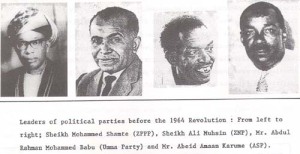Zanzibar comprises of the island of Unguja and Pemba with an estimated population of about 700,000 people. Historical evidence attests ton the fact that people of diverse cultural and racial background, while traversing the high seas, made the islands there primary transit point. Later on came the more permanent settlement. This racial intermingling over the centuries has produced the present-day social fabric better known as “the cultural pot pouri” – for which the islands are singularly famous all over the world and provides source of pride and dignity for its people. For centuries, during its glorious historical period, the islands radiated its culture and political influence to countries far beyond the Great Lakes to the West and the Comoros to the East.
Historically, the islands had been a Sultanate since the 19th century. In 1832 the ruler of Oman, Seyyid Said bin Sultan (later to became the first Sultan of Zanzibar) transferred his capital from Muscat to Zanzibar. In 1890 Zanzibar was granted the British protectorate status and the Foreign Office responsible for Protectorate Affairs ran the administration through the Sultanate and its Arab administrative institutions. In 1913 the Foreign Office in London handed over the responsibility for Zanzibar Affairs to the Colonial Office, and in 1926 the regular colonial system of government was introduced – with both the Executive and Legislative Councils on the one hand and the Judicature on the other.

MOHAMMED SHAMTE (ZPPP), ALI MUHSIN (ZNP), ABDULRAHMAN BABU (UMMA PARTY) AND ABEID KARUME (ASP), LEADING ZANZIBAR POLITICIANS DURING 1960s
It was during this period that the notions of national sovereignty and political independence began to take shape in the minds of the people. This political consciousness was in fact given impetus by certain discriminatory laws forcibly applied by the colonial administration against the people of Zanzibar. “The Rinderpest Revolt” of 1954 was epoch-making in the sense that for the first time in their history the peasants of Zanzibar rose in a revolt against the colonial government.
This uprising, in a single blow, shattered the myth that the colonial government was invincible, marked the beginning of mass organisations, and ushered in the new era of active “party politics”.
Between 1956 and 1960, two commissioners were appointed to advise the government on a scheme for elections – respectively headed by Mr. Walter Coutts and Sir Hillary Blood. This was followed by general elections at different times.
In May 1963, the Constitution Decree was passed and the executive council was replaced by a cabinet of ministers. The National Assembly was established in place of the Legislative Council, with all its 31 members to be elected.
On 24th June 1963, Zanzibar was granted internal self-government and a new Constitution was brought into effect. This was followed by the last general election which commenced on the 8th July 1963. The elections resulted in the formation of a co-alition government between the Zanzibar Nationalist Party (ZNP) and the Zanzibar and Pemba Peoples’ Party (ZPPP) which together had won 18 seats compared to 13 of the Afro Shiraz Party (ASP).
In September 1963, a major Constitutional Conference was held at Lancaster House in London to discuss the granting of independence to Zanzibar. It was agreed that 10th December 1963 be the date for independence and in November 1963 a Bill Supplement published the first Constitution of independent Zanzibar.
The Independence Constitution marked the end of 73 years of British rule. It was the first comprehensive constitutional document for Zanzibar and was modeled after the Westminster Constitution, maintaining the Sultan as the head of state and the Prime Minister as the head of government.
However, the Independence Constitution did not survive long. On January 12th 1964, exactly one month after independence, a violent revolution took place. This joint ASP -Umma Party coup d’etat overthrew the ZNP/ZPPP government and installed in its place a Revolutionary Council. As a result of the overthrow of the co-alition government led by Sheikh Mohammed Shamte, the Sultan Seyyid Jamshid bin Abdallah and his family fled the country. The constitution was suspended and with the proscription of the ZNP and ZPPP, Zanzibar was declared a one-party republic state.

No comments:
Post a Comment